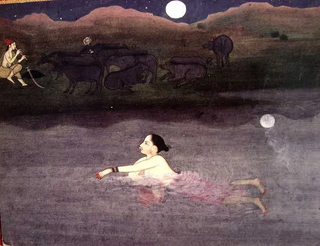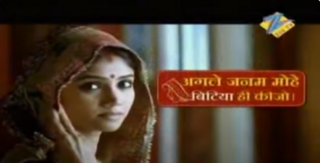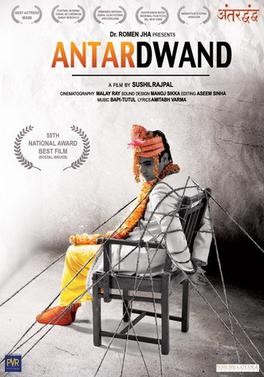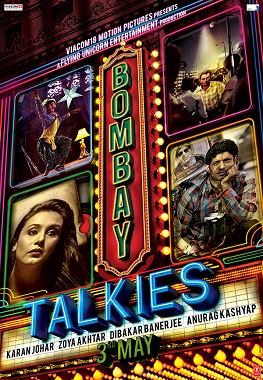
Deewana is a 1992 Indian Hindi-language romantic drama film directed by Raj Kanwar and written by Sagar Sarhadi. It stars Rishi Kapoor, Divya Bharti, and Shah Rukh Khan. The film revolves around an effervescent girl Kaajal (Bharti), depicting her travails as a widow after the disappearance of her husband Ravi (Kapoor) and how her obsessive lover Raja (Khan) wins her over.

Bol is a 2011 Pakistani Urdu language social drama film written, directed and produced by Shoaib Mansoor. The film stars Humaima Malik, Atif Aslam, Mahira Khan, Iman Ali, Shafqat Cheema, Amr Kashmiri, Manzar Sehbai, and Zaib Rehman in the lead roles. The film marks the debut of singer Atif Aslam and Mahira Khan. It concerns a religious Muslim family facing financial difficulties caused by too many children and changing times, with a major plot involving the father's desire to have a son and his rejection of his existing intersex child. Bol was a critical and commercial success and became one of the highest-grossing Pakistani films of all time.

Humko Deewana Kar Gaye is a 2006 Indian Hindi romantic drama film directed by Raj Kanwar, produced by Raj Kanwar, Bhushan Kumar and Krishan Kumar and starring Akshay Kumar, Katrina Kaif, Bipasha Basu, and Anil Kapoor in lead roles. Bhagyashree, Vivek Shauq, Shernaz Patel and Manoj Joshi also star in supporting roles. The film is produced by the Indian music company, T-Series and Inderjit Films Combine. The movie's score and soundtrack is composed by Anu Malik, while Himesh Reshammiya was invited as guest composer to compose only one song. with lyrics by Sameer. The film released on 14 April 2006. The music of the film released on 4 February 2006.

Sohni Mahiwal or Suhni Mehar is one of the seven popular tragic romances of Sindh. The other six are Umar Marvi, Momal Rano, Sassui Punnhun, Lilan Chanesar, Sorath Rai Diyach, and Noori Jam Tamachi. In Punjab, it is four of the most popular romances. The other three are Heer Ranjha, Sassui Punnhun and Mirza Sahiban.

Raja Babu is a 1994 Indian Hindi-language melodrama comedy film directed by David Dhawan. It stars Govinda, Karisma Kapoor, Shakti Kapoor, Kadar Khan, Aruna Irani, Prem Chopra and Gulshan Grover, with music by Anand–Milind and lyrics by Sameer. The film was inspired from the 1992 Tamil film Rasukutty.

Dhaai Akshar Prem Ke is a 2000 Indian Hindi-language romantic drama film. It was the first of seven films which starred real-life couple Abhishek Bachchan and Aishwarya Rai. The film is a remake of the 1995 Hollywood film A Walk in the Clouds. The movie did not do well critically and commercially, but the soundtrack of the film became very popular.

Ab Ke Baras is a 2002 Indian Hindi language action romance film. It had launched the career of the two newcomers, Amrita Rao and Arya Babbar.

Neeli Aankhen is an Indian television supernatural series based on the concept of wishful female serpent. The series premiered on 9 February 2008 on Sahara One.

Agle Janam Mohe Bitiya Hi Kijo is an Indian television series. It premiered on 16 March 2009 on Zee TV. It starred Ratan Rajput, Abhishek Rawat, Sudesh Berry, Mukul Harish, Richa Mukherjee, Dipika Kakar, Aditya Lakhia, Roopa Ganguly and Sukirti Kandpal. The show was produced by Siddharth Kumar Tewary of Swastik Pictures.

Aisha is a 2010 Indian Hindi-language romantic comedy-drama directed by Rajshree Ojha. It features an ensemble cast of Sonam Kapoor, Abhay Deol, Ira Dubey, Cyrus Sahukar, Amrita Puri, Anand Tiwari, Arunoday Singh and Lisa Haydon. It is set in the upper-class society of Delhi, India and is an adaptation of Jane Austen's 1815 novel Emma with the same tone as the cult Hollywood film Clueless which is also an adaptation of Austen's novel. The soundtrack of the film, which was composed by Amit Trivedi with lyrics penned by Javed Akhtar, received highly positive reviews from music critics.

Darling is a 2010 Indian Telugu-language romantic comedy film directed by A. Karunakaran. It is produced by B. V. S. N. Prasad under his studio Sri Venkateswara Cine Chitra. The film stars Prabhas and Kajal Aggarwal. The music is composed by G. V. Prakash Kumar.

Antardwand is a 2010 Indian film co-written, produced and directed by Sushil Rajpal. The film stars Raj Singh Chaudhary and Swati Sen in the leading roles while Vinay Pathak and Akhilendra Mishra play supporting roles. Made on a budget of ₹15 million (US$190,000), the film is based on the cases of groom kidnapping reported in Bihar in India. The film won the National Film Award for Best Film on Social Issues at the 2009 National Awards. Its commercial release was on 27 August 2010.

Dil Se Di Dua... Saubhagyavati Bhava? is an Indian Hindi-language television series. Produced by UTV Software Communications and Trishula Productions it aired on Life OK from 18 December 2011 to 18 January 2013. It starred Sriti Jha, Harshad Chopda and Karanvir Bohra.
Chann Pardesi is a Punjabi language film released in 1981. It was directed by Chitrarth Singh and starred Raj Babbar, Rama Vij, Amrish Puri, Kulbhushan Kharbanda and Om Puri. Chann Pardesi was a seminal film that debuted many future Bollywood legends both in front of and behind the camera, and was Raj Babbar's first ever Punjabi film. Chann Pardesi won India's National Film Award in 1980 and went on to become a big commercial success when it eventually found distribution in 1981.

Himmatwala is a 2013 Indian Hindi-language action comedy film written and directed by Sajid Khan and jointly produced by UTV Motion Pictures and Vashu Bhagnani. The film features Ajay Devgn and Tamannaah Bhatia in the lead roles. Set in 1983, it is an official remake of the 1983 film of the same name by K. Raghavendra Rao, which was, in turn, a remake of the 1981 Telugu film Ooruki Monagadu. The film was released on 29 March 2013. The film marks Tamannaah's comeback to Bollywood after she debuted in the 2005 film Chand Sa Roshan Chehra.
Armaan (transl. Desire) also called Arman, is a Bollywood film. It was released in 1942. Arman was the first film that Kidar Sharma directed for Ranjit Studios and also his first in Bombay since his shift from Calcutta. The story, dialogue and lyrics were also by Sharma. It had music by Gyan Dutt. The cinematographer was D. K. Ambre. The cast included Motilal, Shamim, Nagendra Majumdar, Bhagwandas, and Rajkumari.
Shikaar is a 2004 Bollywood action thriller film directed by Darshan Bagga. The film stars Jaz Pandher and Kanishka Kapoor in lead roles with Raj Babbar, Danny Denzongpa, Prem Chopra, Shakti Kapoor, Ashish Vidyarthi, Tej Sapru, Shweta Menon and Saadhika Randhawa in supporting roles.

Bombay Talkies is a 2013 Indian Hindi-language anthology film consisting of four short films, directed by Karan Johar, Dibakar Banerjee, Zoya Akhtar and Anurag Kashyap. The film released on 3 May 2013, coinciding with and celebrating the 100th year of Indian cinema and the beginning of a new era in modern cinema. It screened at the 2013 Cannes Film Festival on 17 May 2013.

Kkusum is an Indian television series produced by Ekta Kapoor's Balaji Telefilms which aired on Sony Entertainment Television from 14 May 2001 to 30 November 2005. and directed by Jasbir Bhati. The show follows the journey of a young, hardworking and middle class girl, Kkusum and later, after a 20 year leap on her daughter Kkumud.

Lal Dupatta is a 1948 Indian Hindi-language drama film directed by K. B. Lall and produced by Akash Chitra. Starring Madhubala, Rajan Haskar and D. K. Sapru, the film tells the story of Shobha, a headstrong village girl whose romance with a zamindar goes into awry due to some misunderstandings.

















